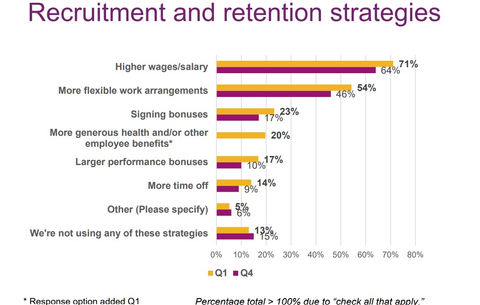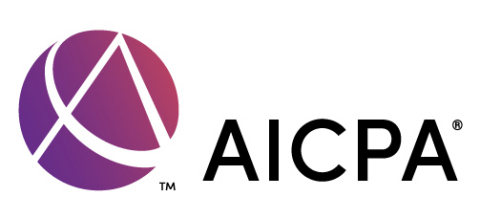Impact of Unfilled Jobs: Staff Restructurings, Delayed Projects and Deferred Expansions
Impact of Unfilled Jobs: Staff Restructurings, Delayed Projects and Deferred Expansions
AICPA & CIMA Survey Polled U.S. Executives on Recruitment and Retention Struggles
NEW YORK--(BUSINESS WIRE)--Almost one in four U.S. business executives said the ongoing impact of unfilled jobs had forced them to restructure staff to protect core operations or limited the pursuit of new projects or bids, according to an AICPA & CIMA survey.
A dearth of skilled job candidates had been a top concern for businesses for years before the pandemic and quickly reemerged as the recovery progressed. Business leaders list “availability of skilled personnel” as a challenge second only to inflation in the latest AICPA Economic Outlook Survey, which polls CEOs, CFOs and other senior-level CPAs and management accountants in the finance function. Top-line results of the quarterly survey were released earlier this month.
Some 82% of business executives said their organizations were having at least some difficulty with recruitment and retention, with 17% characterizing it as extreme difficulty. The latter is actually an improvement from the fourth quarter last year, when it stood at 25%.
Some 31% of survey takers said mid-level staff openings have been the most difficult to fill, while 28% said the problem is across the board. One in four identified entry level positions as the most challenging category to recruit.
While 40% of business executives said unfilled jobs have not had a significant impact on operations, a majority said the problem had manifested itself in several ways within their organizations. The most common outcomes (survey takers could choose more than one):
- Restructured staff to protect core operations (24%)
- Limited new projects or bids (23%)
- Delayed service expansions (16%)
- Slowed customer/client acquisition (9%)
- Reduced hours of operations or work shifts (7%)
- Closed some work locations (3%)
“We know from our survey that 57% of business executives report they have too few employees,” said Ash Noah, CPA, CGMA, vice president and managing director of CGMA learning, education and development for the Association of International Certified Professional Accountants, representing the AICPA and CIMA. “Pandemic-related trends such as the Great Resignation have complicated an already difficult hiring situation, and that can exacerbate burnout and disaffection among remaining staff if the situation isn’t managed carefully.”
To combat the tight labor market, companies have adopted a number of recruitment and retention strategies, principally higher wages and more flexible work arrangements, although the former has been driven in part by inflationary pressures. Signing bonuses are also increasing as a tactic to attract new talent.
Methodology
The first-quarter AICPA Business and Industry Economic Outlook Survey was conducted from Feb. 2-23, 2022, and included 461 qualified responses from CPAs who hold leadership positions, such as chief financial officer or controller, in their companies. The overall margin of error is less than 3 percentage points. A copy of the report can be found on aicpa.org.
About the Association of International Certified Professional Accountants, and AICPA & CIMA
The Association of International Certified Professional Accountants® (the Association), representing AICPA & CIMA, advances the global accounting and finance profession through its work on behalf of 696,000 AICPA and CIMA members, students and engaged professionals in 192 countries and territories. Together, we are the worldwide leader on public and management accounting issues through advocacy, support for the CPA license and specialized credentials, professional education and thought leadership. We build trust by empowering our members and engaged professionals with the knowledge and opportunities to be leaders in broadening prosperity for a more inclusive, sustainable and resilient future.
The American Institute of CPAs (AICPA), the world’s largest member association representing the CPA profession, sets ethical standards for its members and U.S. auditing standards for private companies, not-for-profit organizations, and federal, state and local governments. It also develops and grades the Uniform CPA Examination and builds the pipeline of future talent for the public accounting profession.
The Chartered Institute of Management Accountants (CIMA) is the world’s leading and largest professional body of management accountants. CIMA works closely with employers and sponsors leading-edge research, constantly updating its professional qualification and professional experience requirements to ensure it remains the employer’s choice when recruiting financially trained business leaders.
Contacts
Jeff May
212.596.6122
jeffrey.may@aicpa-cima.com

